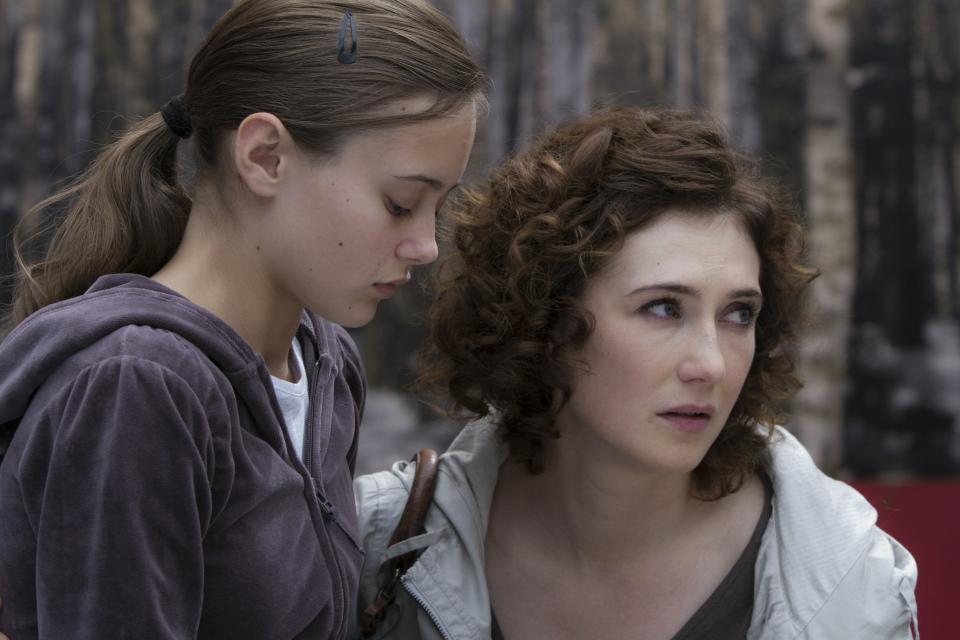
News
Cambridge Residents Slam Council Proposal to Delay Bike Lane Construction

News
‘Gender-Affirming Slay Fest’: Harvard College QSA Hosts Annual Queer Prom

News
‘Not Being Nerds’: Harvard Students Dance to Tinashe at Yardfest

News
Wrongful Death Trial Against CAMHS Employee Over 2015 Student Suicide To Begin Tuesday

News
Cornel West, Harvard Affiliates Call for University to Divest from ‘Israeli Apartheid’ at Rally
‘Intruders’ Breaks Out of Horror Genre’s Limits
Intruders -- Dir. Juan Carlos Fresnadillo (Toei Company) -- 4 Stars

The film title “Intruders” concocts imagery of two bumbling robbers about to vandalize the house while a babysitter idly flips through talk shows and football games. However, the actual film features a welcome intrusion of psychological terror—a bizarre mash-up of “666” and “Inception”—that evades some common pitfalls of the horror genre. With a convincingly younger cast and a refreshing premise that still pays homage to films that came before, “Intruders” stands as an engaging re-interpretation of its genre.
The film splits its time between two seemingly-unrelated children, both of whom are haunted by a type of ghoul called Hollowface. This faceless ghost possesses only one goal in life: to tear the face off of a child to wear in an attempt to find love after losing his own face after 10 years in solitary confinement. One victim and his family live in a derelict abode in Spain; the other lives in an idyllic community in England. In a genre where directors might choose to reveal the villainous specter only at the very end, it is refreshing to know the hauntees and the haunter upfront.
Approximately two minutes into the film, Hollowface enters the room of Juan (Izán Corchero). The little British girl, Mia (Ella Purnell), sets up the suspense as she reads aloud—during a fairly comical scene that shows her terrified third grade class—a story about Hollowface. Shortly after, Mia is grabbed one night by the ghoul, yet is saved by her father (Clive Owen). After listening to the father’s harrowing account, the psychiatrist diagnoses both father and daughter as having the same disorder, one that causes two emotionally bonded people to share the same delusions. This pathologization raises the movie’s central question—is Mia’s dysphoria caused from the trauma of a normal intruder, as her psychiatrists claim, or is it real because Hollowface is succeeding in his attempts to strip away Mia’s sanity? In this way, the film’s strongest aspect is the doubt about whether Hollowface exists or stands merely as a product of Mia and her father’s imagination.
While Juan is repeatedly frightened by Hollowface, his mother claims not to believe him. Yet she too goes for help, but from the local priest, a nice homage to horror classic “The Exorcist.” The priest, believing both the mother and the son to be insane, still goes through tremendous effort to create an elaborate ritual to “save” the little boy. We are left to assume this is because of the vague sexual tension that exists between him and Juan’s mother, one of the sadly underdeveloped points in the film. In comparison to Mia’s storyline, “Intruders” focuses more on a strange type of mysticism in Juan’s family. With better acting ability and a tighter, better-explained plot on the other side of the Channel, it is a relief that the action switches back to Mia’s plight.
After Mia’s father is banned from seeing her, he desperately wanders the streets of London when he brilliantly connects the stories of Juan and Mia—the high point of the movie. However, the movie’s lowest point quickly follows as he reveals Hollowface’s identity in hopes he will set Mia free. The explanation of Hollowface’s identity is illogical and unbelievable, which deprives the movie from a tight, well-written conclusion.
The fault does not lie with the actors not being able to pull off a convincing reveal. Rather, Owen’s performance is nuanced and thus strong. For a movie focused more on fear than finesse, Owen brings a warmth and a strength to the screen in an attempt to convey a father’s imperative to protect his daughter—in this case against both the actual horror and the adult establishment’s disbelief—while still paying due attention to the other role of detective his character is forced to play.
“Intruders” features tight directing and convincingly dreary scenery. The camera work and the dialogue are fluid and compelling, despite a distracting tendency to overuse the soundtrack to create a jarring, melodramatic vibe. However, production values usually mean very little in psychological horror films. It is the characters that make “Intruders” an understated, interesting film. The actors did not overreact with slack jaws or buggy eyes and thus seemed as realistic as possible in an obviously unrealistic situation. It is a new type of horror story, creatively concocted and subtlely told, with a reliance on new myths and establishments to create fear, even if the ending reaches a somewhat convoluted conclusion.
Want to keep up with breaking news? Subscribe to our email newsletter.
